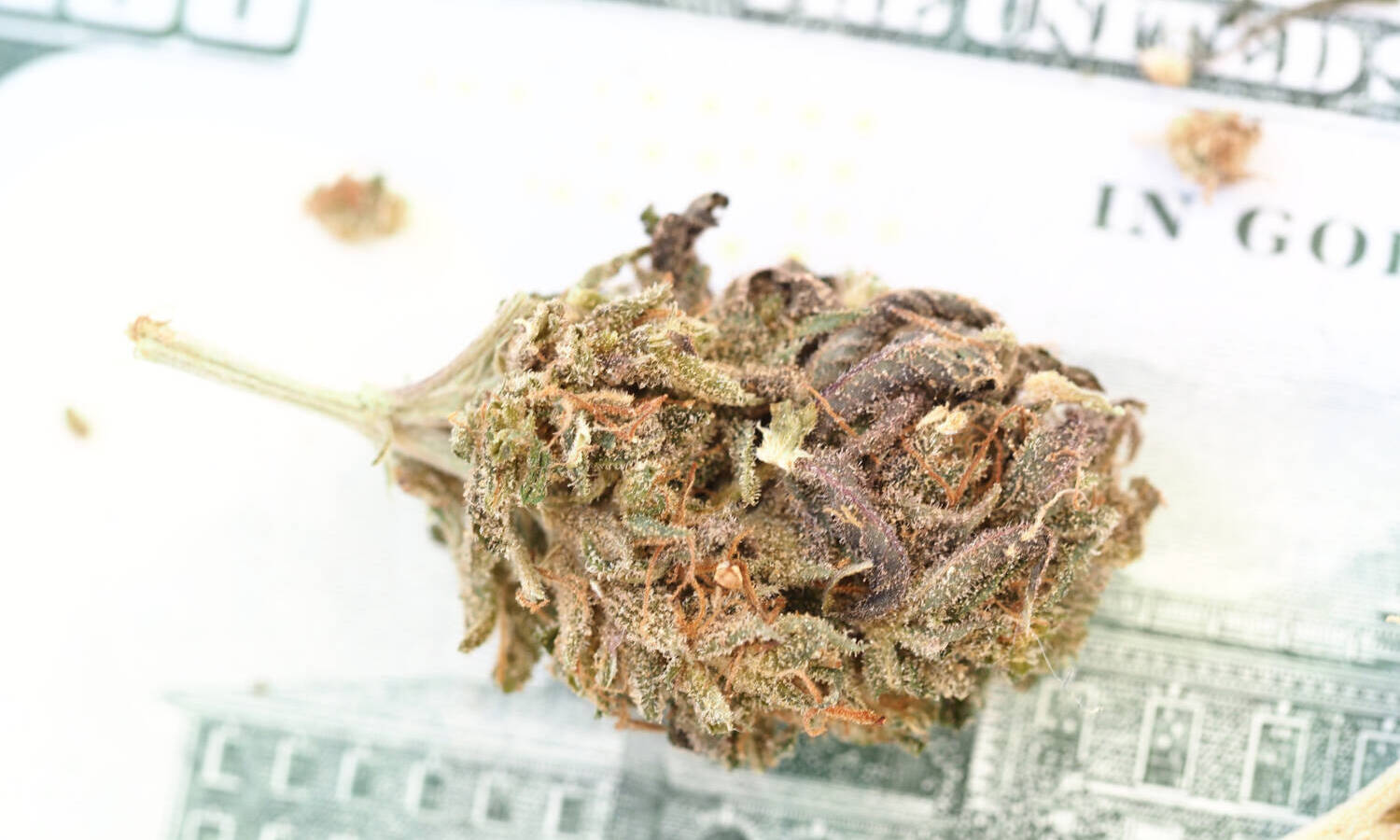Business
Analysts Try To Stay Hopeful On SAFE Act

The industry had been told over several weeks that the legislation looked as if it would pass and that there was support for it.
The cannabis banking bill, the SAFE Act, did not make it into the defense bill despite efforts by Sen. Chuck Schumer. Now attention is turning to possible inclusion in the appropriations bill, but even that might not happen.
More disappointing for the cannabis industry: comments by minority leader Sen. Mitch Mcconnell tagging the banking legislation as a “pet priority.”
“House and Senate Democrats are still obstructing efforts to close out the NDAA by trying to jam in unrelated items with no relationship whatsoever to defense,” McConnell said on the floor on Tuesday. “We’re talking about a grab bag of miscellaneous pet priorities – making our financial system more sympathetic to illegal drugs or the phony, partisan permitting reform and name-only language that’s already failed to pass the Senate earlier this year.”

The industry had been told over several weeks that the legislation looked as if it would pass and that there was support for it. However, that may have just been strategic leaking in order to put pressure on the Republicans.
Stand-Alone Bill?
Cantor Fitzgerald analyst Pablo Zuanic believes the best chance for SAFE now is as a stand-alone bill. He wrote in a new report: “If the bill is to pass at all this lame duck session, it will have to be on a stand-alone basis … (but why didn’t Sen. Schumer pursue that path to start with? Not good optics? Not enough votes?).
Still, if Sen. McConnell indeed sees SAFE as ‘making the financial system more sympathetic to illegal drugs’ (did he just kill SAFE?), we wonder whether he will ‘whip’ Republican Senators not to vote for SAFE (if Sen. Schumer decides to put the bill up for a vote on its own). That said, if we want to be more positive, we could say maybe this is all about ‘horse trading,’ for the now (what gets included in SAFE, or excluded), and for the future (a new Farm Bill?).
Yes, maybe there is a veiled message there (‘Heck, they could have scheduled those matters for a vote this week,’ said Sen. McConnell). If you ask for the probability of the SAFE passage, we now say 49% only (vs. >70% before), but with the MSOS ETF at 12 now, that is not bad risk/reward, in our view.”
Zuanic went on to say that he is increasingly skeptical about other add-ons (to SAFE) being possible at this late stage, no matter how laudable. That includes:
- Veteran equal access
- SBA support
- Safe harbor language for capital market access
- Language around protection for minors
- Specific research for the departments of Justice and Health and Human Services de-scheduling review process.
Unfortunately these add-ons are dealbreakers for some.

Cautious Optimism
Alliance Global Partners wrote in a note that it remains optimistic for passage of SAFE in some form, but analysts acknowledge being cautious due to McConnell’s statements. “While stocks have since been under pressure, we would still note the omnibus bill as a vehicle to pass the SAFE Act, with the bill having bipartisan support & Politico reporting an agreement to include HOPE (social equity) and GRAM Act (gun ownership for cannabis users) as PLUS aspects of the measure.”
Cowen also thinks the omnibus bill could be an option, writing, “Our view remains that the best opportunity for SAFE is inclusion in the omnibus, which should be the final bill this Congress considers before adjourning.”
Cowen believes that the add-ons likely won’t get included. The group also thinks that with 10 Republican votes in favor, there could still be internal pressure on McConnell.
Looking Ahead
Zuanic concluded by saying, “Whether this is a 2023 or 2024 outcome is up to debate (probably more 2024). But we would assign little probability to the scenario that nothing else happens in the next Congress.”
Source: https://thefreshtoast.com/marijuana-legislation/analysts-try-to-stay-hopeful-on-safe-act/
Business
New Mexico cannabis operator fined, loses license for alleged BioTrack fraud

New Mexico regulators fined a cannabis operator nearly $300,000 and revoked its license after the company allegedly created fake reports in the state’s traceability software.
The New Mexico Cannabis Control Division (CCD) accused marijuana manufacturer and retailer Golden Roots of 11 violations, according to Albuquerque Business First.
Golden Roots operates the The Cannabis Revolution Dispensary.
The majority of the violations are related to the Albuquerque company’s improper use of BioTrack, which has been New Mexico’s track-and-trace vendor since 2015.
The CCD alleges Golden Roots reported marijuana production only two months after it had received its vertically integrated license, according to Albuquerque Business First.
Because cannabis takes longer than two months to be cultivated, the CCD was suspicious of the report.
After inspecting the company’s premises, the CCD alleged Golden Roots reported cultivation, transportation and sales in BioTrack but wasn’t able to provide officers who inspected the site evidence that the operator was cultivating cannabis.
In April, the CCD revoked Golden Roots’ license and issued a $10,000 fine, according to the news outlet.
The company requested a hearing, which the regulator scheduled for Sept. 1.
At the hearing, the CCD testified that the company’s dried-cannabis weights in BioTrack were suspicious because they didn’t seem to accurately reflect how much weight marijuana loses as it dries.
Company employees also poorly accounted for why they were making adjustments in the system of up to 24 pounds of cannabis, making comments such as “bad” or “mistake” in the software, Albuquerque Business First reported.
Golden Roots was fined $298,972.05 – the amount regulators allege the company made selling products that weren’t properly accounted for in BioTrack.
The CCD has been cracking down on cannabis operators accused of selling products procured from out-of-state or not grown legally:
- Regulators alleged in August that Albuquerque dispensary Sawmill Sweet Leaf sold out-of-state products and didn’t have a license for extraction.
- Paradise Exotics Distro lost its license in July after regulators alleged the company sold products made in California.
Golden Roots was the first alleged rulebreaker in New Mexico to be asked to pay a large fine.
Source: https://mjbizdaily.com/new-mexico-cannabis-operator-fined-loses-license-for-alleged-biotrack-fraud/
Business
Marijuana companies suing US attorney general in federal prohibition challenge

Four marijuana companies, including a multistate operator, have filed a lawsuit against U.S. Attorney General Merrick Garland in which they allege the federal MJ prohibition under the Controlled Substances Act is no longer constitutional.
According to the complaint, filed Thursday in U.S. District Court in Massachusetts, retailer Canna Provisions, Treevit delivery service CEO Gyasi Sellers, cultivator Wiseacre Farm and MSO Verano Holdings Corp. are all harmed by “the federal government’s unconstitutional ban on cultivating, manufacturing, distributing, or possessing intrastate marijuana.”
Verano is headquartered in Chicago but has operations in Massachusetts; the other three operators are based in Massachusetts.
The lawsuit seeks a ruling that the “Controlled Substances Act is unconstitutional as applied to the intrastate cultivation, manufacture, possession, and distribution of marijuana pursuant to state law.”
The companies want the case to go before the U.S. Supreme Court.
They hired prominent law firm Boies Schiller Flexner to represent them.
The New York-based firm’s principal is David Boies, whose former clients include Microsoft, former presidential candidate Al Gore and Elizabeth Holmes’ disgraced startup Theranos.
Similar challenges to the federal Controlled Substances Act (CSA) have failed.
One such challenge led to a landmark Supreme Court decision in 2005.
In Gonzalez vs. Raich, the highest court in the United States ruled in a 6-3 decision that the commerce clause of the U.S. Constitution gave Congress the power to outlaw marijuana federally, even though state laws allow the cultivation and sale of cannabis.
In the 18 years since that ruling, 23 states and the District of Columbia have legalized adult-use marijuana and the federal government has allowed a multibillion-dollar cannabis industry to thrive.
Since both Congress and the U.S. Department of Justice, currently headed by Garland, have declined to intervene in state-licensed marijuana markets, the key facts that led to the Supreme Court’s 2005 ruling “no longer apply,” Boies said in a statement Thursday.
“The Supreme Court has since made clear that the federal government lacks the authority to regulate purely intrastate commerce,” Boies said.
“Moreover, the facts on which those precedents are based are no longer true.”
Verano President Darren Weiss said in a statement the company is “prepared to bring this case all the way to the Supreme Court in order to align federal law with how Congress has acted for years.”
While the Biden administration’s push to reschedule marijuana would help solve marijuana operators’ federal tax woes, neither rescheduling nor modest Congressional reforms such as the SAFER Banking Act “solve the fundamental issue,” Weiss added.
“The application of the CSA to lawful state-run cannabis business is an unconstitutional overreach on state sovereignty that has led to decades of harm, failed businesses, lost jobs, and unsafe working conditions.”
Business
Alabama to make another attempt Dec. 1 to award medical cannabis licenses

Alabama regulators are targeting Dec. 1 to award the first batch of medical cannabis business licenses after the agency’s first two attempts were scrapped because of scoring errors and litigation.
The first licenses will be awarded to individual cultivators, delivery providers, processors, dispensaries and state testing labs, according to the Alabama Medical Cannabis Commission (AMCC).
Then, on Dec. 12, the AMCC will award licenses for vertically integrated operations, a designation set primarily for multistate operators.
Licenses are expected to be handed out 28 days after they have been awarded, so MMJ production could begin in early January, according to the Alabama Daily News.
That means MMJ products could be available for patients around early March, an AMCC spokesperson told the media outlet.
Regulators initially awarded 21 business licenses in June, only to void them after applicants alleged inconsistencies with how the applications were scored.
Then, in August, the state awarded 24 different licenses – 19 went to June recipients – only to reverse themselves again and scratch those licenses after spurned applicants filed lawsuits.
A state judge dismissed a lawsuit filed by Chicago-based MSO Verano Holdings Corp., but another lawsuit is pending.
Source: https://mjbizdaily.com/alabama-plans-to-award-medical-cannabis-licenses-dec-1/
-

 Business2 years ago
Business2 years agoPot Odor Does Not Justify Probable Cause for Vehicle Searches, Minnesota Court Affirms
-

 Business2 years ago
Business2 years agoNew Mexico cannabis operator fined, loses license for alleged BioTrack fraud
-

 Business2 years ago
Business2 years agoAlabama to make another attempt Dec. 1 to award medical cannabis licenses
-

 Business2 years ago
Business2 years agoWashington State Pays Out $9.4 Million in Refunds Relating to Drug Convictions
-

 Business2 years ago
Business2 years agoMarijuana companies suing US attorney general in federal prohibition challenge
-

 Business2 years ago
Business2 years agoLegal Marijuana Handed A Nothing Burger From NY State
-

 Business2 years ago
Business2 years agoCan Cannabis Help Seasonal Depression
-

 Blogs2 years ago
Blogs2 years agoCannabis Art Is Flourishing On Etsy









